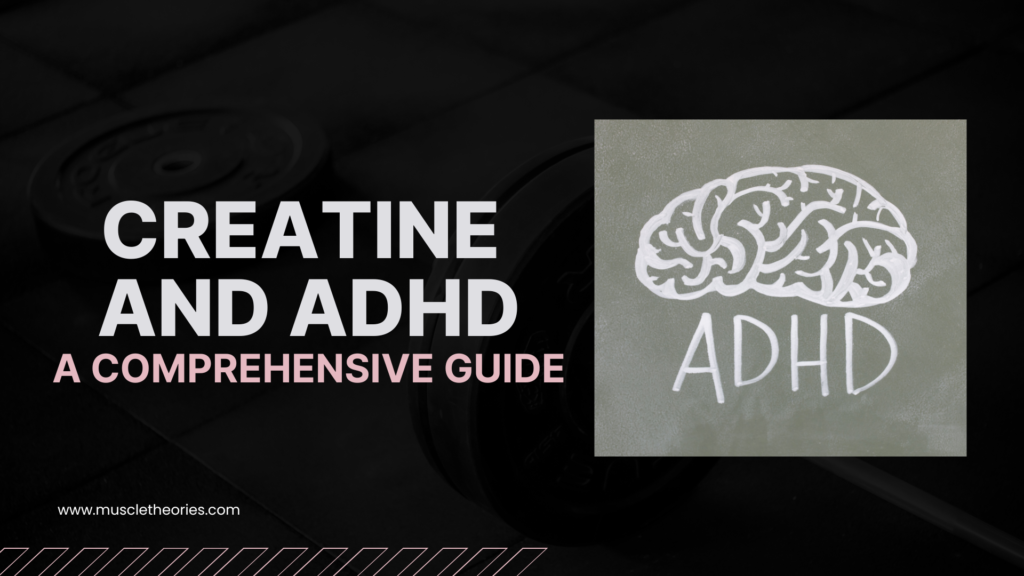Managing ADHD often feels like juggling a million things at once. Between medications, lifestyle changes, and dietary tweaks, it’s natural to wonder if certain supplements can help alleviate symptoms. Enter creatine—best known for its role in sports nutrition. But could it also benefit individuals with ADHD? In this article, I’ll dive deep into the science, research, and potential cognitive benefits of creatine for those living with ADHD.
Understanding The Science Behind Creatine and ADHD
What is Creatine?
Creatine is a naturally occurring compound found in muscle cells and the brain. It’s best known for its role in energy production, particularly in high-intensity physical activities. People often take creatine supplements to boost exercise performance, but it also has emerging potential in cognitive health.
How Does Creatine Work in the Body?
Creatine helps regenerate adenosine triphosphate (ATP)—the body’s primary energy currency. In simple terms, it provides an energy reserve for cells, including brain cells, enabling them to function optimally, especially under stress or during intense tasks.
What is ADHD?
Attention Deficit Hyperactivity Disorder (ADHD) is a neurodevelopmental condition that affects both children and adults. It is characterized by symptoms like inattention, hyperactivity, and impulsivity, which can interfere with daily functioning and quality of life.
The Neurological Basis of ADHD: An Overview
ADHD stems from neurological differences, particularly in the brain’s ability to regulate neurotransmitters such as dopamine and norepinephrine. These chemicals are critical for controlling attention, behavior, and emotional responses.
Creatine’s Role in Brain Health and Cognition
How Creatine Affects Brain Energy Metabolism
The brain is an energy-intensive organ, and creatine plays a pivotal role in ensuring that brain cells maintain their energy levels. By supporting ATP production, creatine helps the brain sustain focus, attention, and cognitive performance—areas often impaired in individuals with ADHD.
Creatine and Neurotransmitters: A Deeper Look into Dopamine and Serotonin
Dopamine dysregulation is a hallmark of ADHD. While creatine itself doesn’t directly increase dopamine, it indirectly supports neurotransmitter function by providing the brain with the energy it needs to efficiently produce and release these chemicals. This energy boost could help improve dopamine signaling, potentially benefiting ADHD symptoms like inattention and impulsivity.
The Potential Cognitive Benefits of Creatine Beyond ADHD
Beyond ADHD, creatine has shown promise in enhancing cognitive function and also other conditions like traumatic brain injury, depression, and age-related cognitive decline. These findings suggest that creatine’s cognitive benefits may extend beyond physical energy to overall mental sharpness and resilience.
Exploring the Connection: Creatine and ADHD
Does Creatine Help with ADHD Symptoms? What Studies Say
While research on creatine specifically for ADHD is limited, early findings show potential. Some studies on brain energy metabolism suggest that increasing cellular energy through creatine supplementation could improve attention and focus—core symptoms of ADHD.
Creatine’s Impact on Attention and Focus
Creatine’s ability to boost ATP production may support sustained attention and reduce mental fatigue, which is often experienced by those with ADHD. It’s not a cure-all, but it could offer a supplemental benefit for those struggling with focus.
Could Creatine Influence Hyperactivity and Impulsivity?
Hyperactivity and impulsivity are complex behaviors influenced by multiple neurological factors. While creatine may not directly reduce these symptoms, it could help by improving overall brain function and making other ADHD treatments more effective.
Creatine and Executive Functioning: A Possible Link
Executive functioning—the ability to plan, focus, and execute tasks—is often impaired in ADHD. Creatine’s role in enhancing brain energy could indirectly support executive function, leading to improvements in organization, problem-solving, and task completion.
Scientific Research on Creatine for ADHD
A Review of Key Studies on Creatine and Cognitive Function in ADHD
A 2018 study examining creatine’s effect on cognitive function in healthy individuals found that it improved working memory and mental clarity. This is important because ADHD often impairs these cognitive areas, indicating potential crossover benefits for those with the condition.
Ongoing Research: Promising Areas for Future Studies
As research continues, scientists are particularly interested in how creatine might interact with ADHD medications like stimulants. Combining supplements and medications could create new treatment strategies that optimize both energy and neurotransmitter balance in the brain.
Using Creatine for ADHD: Practical Insights
How to Use Creatine Safely for ADHD
If you’re considering adding creatine to your ADHD management plan, it’s essential to start with a low dose—typically 3-5 grams per day—and monitor your body’s response. Always consult with a healthcare professional before adding any supplement to your routine.
Creatine Dosage for ADHD: What Experts Recommend
Most experts recommend starting with the standard dose used in sports nutrition: 3-5 grams of creatine monohydrate per day. There’s no need for the high “loading phase” common in fitness circles, especially if the goal is cognitive enhancement.
Can Creatine Be Used Alongside ADHD Medications like Adderall?
Current research shows no significant interactions between creatine and ADHD medications such as Adderall or Ritalin. However, it’s crucial to consult your doctor before combining supplements with prescription drugs.
Who Should Avoid Creatine: Understanding the Risks
Creatine is generally safe for most people, but those with kidney disease or other metabolic disorders should avoid it. As always, consult your healthcare provider before starting any new supplement.
If you want to read more about creatine and kidney health, I’d recommend reading the article “Is Creatine Safe for the Kidneys?“, where I talk about the impact of creatine supplementation on the kidneys.
Potential Side Effects and Risks of Creatine for ADHD
Possible Side Effects of Creatine in Individuals with ADHD
Creatine is considered safe when taken at the recommended dosage. However, some people may experience minor side effects like bloating or gastrointestinal discomforts like constipation and diarrhea. Always start with a low dose to assess tolerance.
To understand more about creatine-induced bloating and gastrointestinal discomforts, read these two articles:
Can Creatine Affect Mood or Cause Brain Fog?
There’s no conclusive evidence linking creatine to mood changes or brain fog. Again, studies suggest that creatine may improve mental clarity by supporting energy metabolism in the brain.
Creatine and ADHD Medications: Potential Interactions
There are no well-documented interactions between creatine and ADHD medications but always err on the side of caution. Discuss with your healthcare provider before combining supplements with your ADHD treatment.
Is Creatine Safe for Long-term Use in ADHD Treatment?
Research indicates that creatine is safe for long-term use in healthy individuals (specifically for up to five years), but its long-term effects on ADHD specifically are less studied. Monitoring and regular check-ins with your doctor are recommended.
Comparing Creatine to Other ADHD Supplements
Creatine vs. Omega-3 Fatty Acids for ADHD: Which Is Better?
Omega-3 fatty acids are another popular supplement for ADHD, with strong evidence supporting their role in improving focus and reducing impulsivity. While both creatine and Omega-3s offer cognitive benefits, they work in different ways and could be complementary rather than competitive.
Creatine and Other Nootropics: Synergistic or Conflicting Effects?
Creatine can be combined with other nootropics, like caffeine or L-theanine, for a synergistic effect. However, avoid stacking too many supplements without professional guidance, as this could lead to overstimulation or conflicting effects.
Natural Alternatives to Creatine for ADHD Management
Other natural supplements, like ginkgo biloba and Rhodiola rosea, also show potential in managing ADHD symptoms. Each supplement works differently, so it’s important to explore which option best fits your unique needs.
FAQ – Creatine and ADHD
Can Creatine Help Improve ADHD Symptoms Like Focus and Attention?
Yes, creatine may help improve focus and attention by supporting brain energy metabolism. It’s not a standalone treatment, but it could complement existing ADHD therapies.
How Does Creatine Affect Dopamine Levels in the Brain?
Creatine supports brain energy metabolism, which can indirectly improve dopamine function. This could help with ADHD symptoms like inattention and impulsivity, though more research is needed.
Can Creatine Cause or Worsen ADHD Symptoms?
There’s no evidence to suggest that creatine worsens ADHD symptoms. However, if you notice any negative changes after starting creatine, stop use and consult your doctor.
What Are the Best Types of Creatine for ADHD?
Creatine monohydrate is the most researched and widely recommended form of creatine. It’s also the most cost-effective and easiest to find.
Is It Safe to Combine Creatine with ADHD Medications?
There’s no strong evidence that creatine interacts negatively with ADHD medications, but you should always consult your doctor before combining any supplements with prescription drugs.
Final Thoughts on Creatine and ADHD
The Future of Creatine as a Potential ADHD Supplement
While the research is still in its infancy, creatine shows promise as a supplement that could support cognitive function in individuals with ADHD. As more studies are conducted, we’ll better understand how creatine can be integrated into ADHD treatment plans.
Key Takeaways: Creatine’s Potential Benefits and Risks for ADHD
- Creatine may help boost brain energy, potentially improving attention and focus.
- Current research is limited, and more studies are needed to confirm creatine’s effectiveness for ADHD.
- Always consult a healthcare provider before starting creatine, especially if you’re on medication for ADHD.

Mohammad Nazif Uddin is a Marketing and Supply Chain Management student and fitness enthusiast with over 5 years of bodybuilding experience. As the founder of Muscle Theory, he shares practical insights on fitness supplements to help others make informed choices and achieve their goals safely.


Pingback: How Much Creatine Is Too Much?